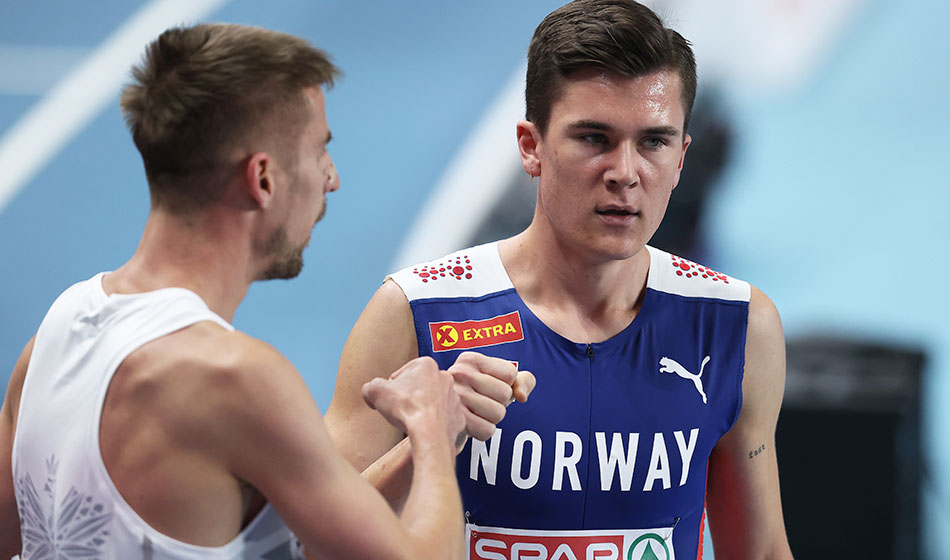
Norwegian star reveals that the nerves which come from meeting his own high expectations and the prospect of pain help drive him towards racing success
Is there anything Jakob Ingebrigtsen gets nervous about? In his exclusive interview in the April issue of AW magazine, the Norwegian star talks with real assurance about how he plans to put himself at the summit of his sport. His aim? “To be too fast for everybody else, which means that I can basically do what I want and I will still win.”
The 20-year-old exudes confidence in his ability and was in complete control when winning both the 1500m and 3000m at last month’s European Indoor Championships. There is a very clear air of calm around him, too, but he does admit that nerves play a significant part in his racing life.
Nerves when it comes to the pressure of meeting his own expectations but also nerves surrounding – particularly when it comes to the 1500m – the prospect of pain.
“Yeah, I’d say so,” he answers when asked if he’s good at channelling that nervous energy.
“If there’s a lot at stake then you’re obviously going to get more nervous than if it’s just a random race but I usually get really nervous – not only because of my expectations but it’s also about the pain [that comes] with racing. I don’t enjoy being in pain.”
He adds: “It’s difficult to describe but the 1500m is probably the most painful race because you are going out at such a high speed and after 500 metres you are really hitting a wall. But then, when you continue you don’t slow down, you just run faster and faster. Or at least that’s my experience.
“If you are really well prepared and you do what you need to do going into that race it’s going to end up pretty good and you’re not going feel that much pain after all. But I know, going into my next race, I get really nervous [again] because of the pain.
“But I think that’s my way of preparing myself physically and mentally for each race – to be nervous of the pain that’s coming but also to be awake and focused on the task so I can run as fast as possible.”
Expectation does now follow the 1500m European record-holder both indoors and out whenever he toes a start line. But the man who is coached by his father Gjert and trains with brothers Henrik and Filip is not usually one to dwell on outside opinion.
“Expectations are always a good thing but I usually don’t read comments from other people because I know I’m going to be really disappointed if I’m not winning,” he says.
“Even if I’m a worse runner than my competitors, I’ll still aim for finishing first.
“My mentality going into races is that I’m always going to win so I would say the expectations that I put on myself are always going to be a little bit harder to fulfil than everybody else’s.”
To achieve those goals, the Ingebrigtsen family is well known for laying the groundwork through a regime of threshold training. That is, finding the pace and the sweet spot where lactate levels are held stable rather than flooding the system.
Only just out of his teens, one of the most fascinating and exciting things about Jakob is that he is still growing and becoming stronger.
“We rarely train very hard in each session, so we limit our speed to 22/23kph because it takes a lot of energy to run faster than that,” explains the 1500m and 5000m European champion. “We limit our pace and then we adjust each session.
“I don’t push my speed in my sessions now compared to a couple of years ago because I believe that I only need to do this training to get the maximum out of my sessions. I have increased a little bit in mileage and a little bit in pace.
“I feel each interval session is getting a little bit easier each day or each month so you feel stronger and I’m really lucky to have Henrik and Filip being at a really high level in training so that we can always compare each other with lactate levels and also our pace from different sessions.
“I think the most the important thing is to do this week after week.”
A steady climb has been preferred to a rapid ascent.
“I’ve always trained or done a lot of mileage since I was a kid but I’ve increased each year,” he adds. “I would say that I did the maximum mileage that I was capable of handling physically and, at the same time, running as fast as I could in races.
“My mileage wasn’t bigger than I could do in races when I was nine, 10, 11, 12 and then I’ve just increased.
“I’ve had injuries as well as my body has gotten used to the mileage but for my father it’s important for him to write everything down. We know what I’ve done the last 10 years and from that you can start to increase little by little.
“As long as you stay healthy and everything – and also race fast – you know that you’re not training too much.”















 Phone: (800) 737. 6040
Phone: (800) 737. 6040 Fax: (800) 825 5558
Fax: (800) 825 5558 Website:
Website:  Email:
Email: 






